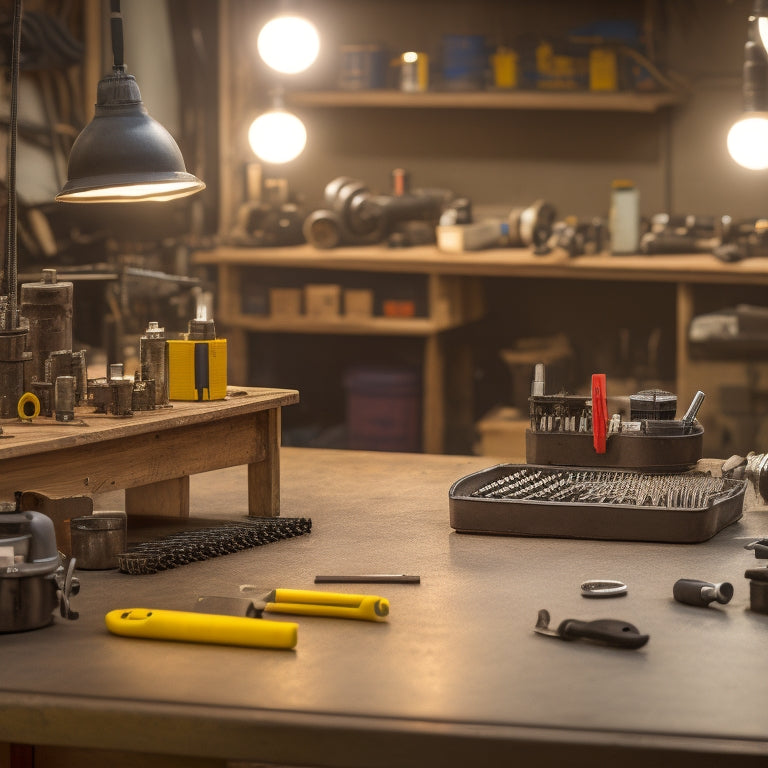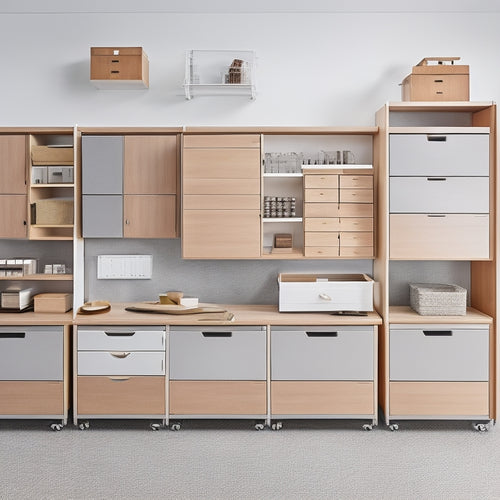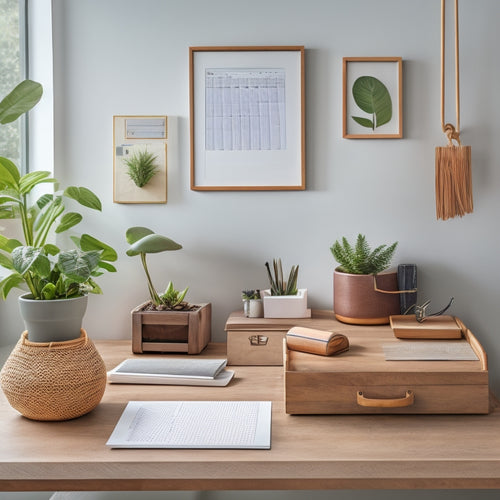
Essential Socket Holders for DIY Enthusiasts
Share
You know how a cluttered toolbox can turn into a productivity-killing nightmare. That's why essential socket holders are a must-have for DIY enthusiasts like you. With the right holder, you'll reduce wasted time searching for specific sockets, prevent accidents, and enhance your overall workspace organization. You'll need to evaluate the type of holder, material, and size that fits your socket set requirements. From magnetic holders to compact designs, there are many options available. By understanding the importance of socket organization and the features that matter, you'll be well on your way to streamlining your DIY projects. Now, take a closer look at the world of socket holders to find the perfect fit for your needs.
Key Takeaways
- A well-organized socket holder enhances access to tools, reduces clutter, and fosters a safer DIY environment.
- Magnetic socket holders provide strong retention, quick retrieval, and reduced clutter, making them a popular choice among DIY enthusiasts.
- Socket holder size and material selection are crucial, considering factors like durability, weight capacity, and compatibility with socket sets.
- Reputable brands like DeWalt, Milwaukee, and Mac Tools offer high-quality socket holders with secure retention and robust designs.
- Proper maintenance and inspection of socket holders are essential to prevent rust, corrosion, and misalignment, ensuring optimal functionality and safety.
Importance of Socket Organization
A cluttered toolbox can be a DIY enthusiast's worst nightmare, and socket disorganization is often at the heart of the problem.
You've probably wasted precious time searching for a specific socket, only to find it buried beneath a pile of other tools.
This lack of organization not only hampers your productivity but also increases the risk of accidents and mistakes.
Types of Socket Holders Available
You'll find socket holders made from various materials, each with its own set of benefits and drawbacks.
The size of the socket holder is also an essential consideration, as you'll need one that can accommodate your specific socket set.
Additionally, you may want to investigate magnetic socket holders, which offer a convenient and space-saving way to store your sockets.
Socket Holder Materials
Socket holders come in a variety of materials, each with its unique set of benefits and drawbacks.
You'll want to choose a material that suits your needs and guarantees your safety while working on projects.
When selecting a socket holder, consider the following materials:
-
Aluminum: Lightweight and corrosion-resistant, making it ideal for workshops with high humidity. It's also a cost-effective option.
-
Stainless Steel: Offers exceptional durability and resistance to corrosion, making it perfect for heavy-duty use.
-
Plastic: A budget-friendly option that's resistant to corrosion and easy to clean, but may not be as durable as other materials.
Each material impacts the overall design and features of the socket holder.
For instance, aluminum socket holders often have a sleeker design, while stainless steel ones may have a more rugged build.
Understanding the material's strengths and weaknesses will help you make an informed decision when choosing a socket holder that fulfills your needs.
Socket Holder Sizes
Your socket holder's material is just one aspect to contemplate; its size and type are equally important. You'll want to verify your socket holder can accommodate the various socket sizes you have in your toolkit. Socket holders come in different sizes, each designed to hold specific socket sizes.
| Socket Holder Type | Socket Sizes | Compatibility |
|---|---|---|
| Small | 1/4", 3/8" | Ideal for compact toolkits and small projects |
| Medium | 1/2", 3/4" | Suitable for general-purpose toolkits and DIY projects |
| Large | 1", 1 1/2" | Best for heavy-duty toolkits and industrial applications |
When choosing a socket holder, consider the range of socket sizes you need to store. Confirm the holder is compatible with your socket set to prevent damage or misplacement. Remember, a socket holder that can accommodate multiple socket sizes can help you stay organized and increase your productivity. By selecting the right socket holder size, you'll be able to efficiently store and access your sockets, making your DIY projects safer and more efficient.
Magnetic Socket Holders
Organization is key to a successful DIY project, and a well-designed socket holder can make all the difference.
When it comes to keeping your sockets organized and within reach, magnetic socket holders are an excellent option. These holders employ strong magnetic forces to keep your sockets securely in place, making them easily accessible when you need them.
Magnetic socket holders offer several benefits, including:
-
Strong magnetic strength: Holding your sockets firmly in place, even in busy workshops or on-the-go projects.
-
Easy socket accessibility: Allowing you to quickly grab the socket you need, without having to dig through a cluttered toolbox.
-
Reduced clutter: Keeping your workspace organized and free from scattered sockets, reducing the risk of lost or damaged tools.
Socket Holder Materials Matter
When choosing a socket holder, you'll need to take into account the material it's made of, as it greatly impacts the tool's performance and longevity.
Metal and plastic are the two primary options, each with its own set of advantages and disadvantages.
You'll want to assess the durability of each material, as well as its weight capacity, to guarantee you select the best socket holder for your specific needs.
Metal Vs. Plastic
Socket holders' durability hinges on the material used, and DIY enthusiasts often face a crucial decision: metal or plastic?
When choosing between these two options, you need to take into account several key factors.
Metal socket holders have several advantages. For instance:
- They're more durable and less prone to breakage, making them a safer choice for heavy-duty projects.
- They can be customized to fit your specific needs, offering more versatility than plastic holders.
- They've a longer lifespan, reducing the need for frequent replacements and minimizing environmental waste.
On the other hand, plastic socket holders are often lighter and more cost-effective. However, they may not be as durable, and their plastic material can be more prone to damage.
Ultimately, the decision between metal and plastic comes down to your personal preferences, project requirements, and priorities.
Durability Tests
You've weighed the pros and cons of metal and plastic socket holders, considering factors like durability, customization, and cost-effectiveness.
Now, it's time to put these materials to the test. Durability tests are essential in evaluating the performance of socket holders, and you should take the results into account before making a purchase.
Look for manufacturers that provide detailed performance metrics, such as drop tests, crush tests, and corrosion resistance tests. These metrics will give you a clear understanding of how well a socket holder can withstand the rigors of your DIY projects.
Additionally, pay attention to user feedback and reviews from other DIY enthusiasts who've used the product in real-world scenarios.
When evaluating durability tests, consider the environmental conditions in which you'll be using the socket holder. Will you be working in a humid or dusty environment? Do you need a socket holder that can withstand extreme temperatures?
Weight Capacity Matters
Three key factors - material strength, holder design, and construction quality - determine a socket holder's weight capacity. You want a holder that can handle the socket load without compromising your safety or the tool's performance.
A socket holder's weight capacity is critical, as it directly affects the weight distribution and, ultimately, the holder's ability to support the socket.
When evaluating a socket holder's weight capacity, consider the following:
-
Material strength: The holder's material should be sturdy enough to withstand the weight of the socket and any additional loads.
-
Holder design: A well-designed holder distributes the weight evenly, reducing the risk of damage or breakage.
-
Construction quality: A holder built with high-quality materials and craftsmanship can support heavier socket loads.
Best Socket Holder Brands
Your toolbox's most trusted allies are socket holders from reputable brands, designed to keep your workspace organized and your projects moving efficiently. When selecting a socket holder, you want a brand that prioritizes quality, durability, and safety.
Look for brands with excellent socket holder reviews, featuring products with sturdy socket holder features such as rust-resistant materials, secure socket retention, and easy-to-read labels.
Top brands like DeWalt, Milwaukee, and Mac Tools offer high-quality socket holders that meet these standards. DeWalt's socket holders are known for their heavy-duty construction and adjustable dividers, while Milwaukee's holders boast a compact design and magnetic socket retention.
Mac Tools' socket holders feature a unique ratcheting system, allowing for easy socket removal and storage.
When researching socket holder brands, pay attention to features that guarantee safety and efficiency. Read socket holder reviews to get a sense of how well a brand's products perform in real-world applications.
Socket Holder Size Considerations
When selecting a socket holder, consider the space where it will be stored and the number of sockets you need to organize, as the ideal size will depend on these factors.
You'll want to make certain the holder fits comfortably in your toolbox or on your workbench without overcrowding.
To determine the right size, measure the space available and count the number of sockets you need to store.
Consider the following factors:
- Socket compatibility: Will the holder accommodate your socket set, including any larger or irregularly shaped sockets?
- Size measurement: Measure the length, width, and height of the space where the holder will be stored to make certain of a snug fit.
- Socket storage capacity: How many sockets do you need to store, and will the holder provide enough slots to keep them organized and easily accessible?
Mounting Options for Socket Holders
Secure your socket holder in place with a mounting option that suits your workspace. A well-chosen mounting technique not only guarantees tool organization but also enhances workspace efficiency. You can opt for wall brackets, which provide a sturdy base for your socket holder, or adjustable mounts that allow for flexibility in installation. Consider the surface compatibility of your mounting option to guarantee a secure fit.
| Mounting Option | Installation Method | Surface Compatibility |
|---|---|---|
| Wall Brackets | Screws or Adhesive | Wood, Metal, Drywall |
| Adjustable Mounts | Clamps or Suction Cups | Wood, Metal, Glass |
| Removable Options | Magnetic or Hook-and-Loop | Metal, Wood, Plastic |
When selecting a mounting option, prioritize tool accessibility and storage solutions that cater to your specific needs. By doing so, you'll create a safe and efficient workspace that streamlines your DIY projects. Remember to follow the manufacturer's installation instructions to guarantee a secure and reliable mounting system.
Socket Holder Accessories Explained
What makes a socket holder truly efficient? It's the accessories that come with it. These additional features can boost your DIY experience, ensuring you get the job done safely and efficiently.
When choosing a socket holder, consider the following accessories:
-
Extension bars: These allow you to reach bolts and nuts in tight spaces, making it easier to work in confined areas.
-
Ratcheting adapters: They provide flexibility when working with different socket sizes, ensuring you have the right fit for the job.
-
Magnetic strips: These help keep your sockets organized and within reach, reducing the risk of misplacement and saving you time.
These accessories can greatly enhance your socket holder's features and compatibility.
Look for a socket holder that offers a range of accessories to cater to your specific needs. By doing so, you'll be able to tackle various projects with confidence, knowing you have the right tools for the job.
DIY Socket Holder Hacks
Get creative with your socket holder by repurposing everyday items to create custom holders and organizers. You can turn an old wooden ruler into a socket strip, or use a magnetic board to store your sockets within easy reach.
These DIY socket holder hacks will help you maximize your workshop's efficiency without breaking the bank.
One clever solution is to attach a socket holder to the side of your workbench using a 3M adhesive strip. This keeps your sockets organized and saves important space. You can also repurpose a small plastic container, such as a mint tin, to store small sockets and accessories.
For a more permanent solution, consider building a custom socket holder using wood or metal. With some creativity and basic DIY skills, you can create a customized tool storage system that fits your specific needs.
These budget-friendly options will help you stay organized and focused on your projects. By implementing these socket holder hacks, you'll be able to quickly find the right socket, reduce clutter, and increase your workshop's overall efficiency.
Socket Holder Maintenance Tips
Now that you've optimized your workshop with DIY socket holders, it's time to guarantee they remain functional and organized over time. To make certain your socket holders continue to serve you well, regular maintenance is essential. This involves more than just cleaning your sockets; it's about implementing a thorough maintenance strategy that covers socket cleaning, rust prevention, proper storage, and more.
Here are some vital socket holder maintenance tips to keep in mind:
-
Periodic Inspections: Regularly inspect your socket holders for signs of wear and tear, such as rust, corrosion, or misalignment. This helps you identify replacement indicators early on, making sure your tools remain safe and functional.
-
Alignment Checks: Verify that your socket holders are properly aligned with your tools to prevent damage or accidents. This is especially important when working with high-torque tools or in situations where precision is critical.
-
Usage Guidelines: Establish clear usage guidelines for your socket holders, including safety precautions and tool compatibility protocols. This helps prevent misuse and makes certain your socket holders remain organized and functional over time.
Frequently Asked Questions
Can I Use a Socket Holder for Other Tools Besides Sockets?
You can repurpose a socket holder for other tools, but it depends on the holder type and tool size. Consider versatile holders with adjustable dividers for ideal tool organization, ensuring a safe and efficient workspace.
Are Socket Holders Compatible With All Socket Sets?
Ha! You think all socket holders are created equal? Think again! You'll find that not all socket holders are compatible with every socket set. Research the different socket holder types to guarantee compatibility, and don't assume a universal fit - safety first!
Can I Customize a Socket Holder to Fit My Specific Needs?
You can customize a socket holder to fit your specific needs by exploring various customization options, such as selecting durable socket holder materials like steel or aluminum, and choosing the ideal size and shape to suit your workspace and tool organization requirements.
Do Socket Holders Come With a Warranty or Guarantee?
You'll typically find that manufacturers offer warranty policies and product guarantees, ensuring your socket holder meets quality standards; these guarantees usually cover defects, materials, and workmanship for a specified period, giving you peace of mind and protection.
Are Socket Holders Suitable for Heavy-Duty Industrial Use?
You'll find that most socket holders are designed for lighter DIY tasks, but if you need heavy-duty industrial use, look for holders made with rugged materials like steel or durable polymers, ensuring industrial socket durability and reliability.
Conclusion
As you wrap up your DIY project, you're left with a sense of accomplishment - and a cluttered workspace. Don't let disorganization derail your momentum. Invest in an excellent socket holder that's customized to your needs. With the right holder, you'll be able to tackle your next project with precision and ease, your tools within easy reach. By keeping your sockets in check, you'll avoid the frustration of lost time and energy, and instead, channel it into creating something truly extraordinary.
Related Posts
-

Modular Tool Storage Systems for Small Spaces
You can optimize your small workspace by leveraging modular tool storage systems that intelligently employ vertical s...
-

Best Organizing Tools for a Clutter-Free Space
You're on a mission to change your cluttered space into a peaceful oasis, and you're looking for the best organizing ...
-

What Size Rolling Storage Bin Do I Need
To determine the ideal size of your rolling storage bin, you'll need to measure your storage space accurately, consid...


